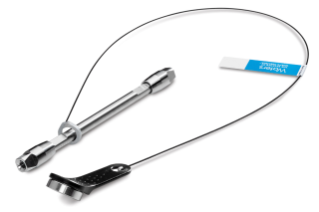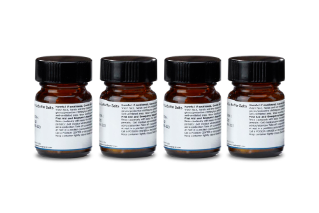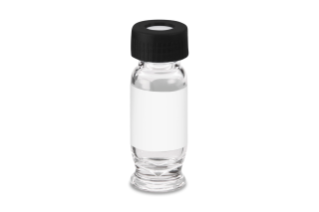Simple and Efficient Peptide MAM Analysis Using Fast Trypsin Digestion and the BioAccord™ LC-MS System
Abstract
With the increasing prevalence of multi-attribute method (MAM) workflows in the biopharmaceutical industry comes the desire for higher throughput and reduced burdens for data analysis. Successful MAM analyses heavily rely on consistent and reproducible protein digestion yielding minimal sample preparation induced modifications, which increase complexity and can lead to increased effort for data review. RapiZyme™ Trypsin is a new, commercially available, highly active autolysis-resistant enzyme that provides quick, clean, and complete mAb digestions in just 30 minutes. The shorter the digestion time, the less likely that artificial modifications may occur during the sample preparation prior to LC-MS analysis. This is highly desirable, as MAM analysis typically focuses on tracking levels of post-translational modifications (PTMs) such as deamidation and oxidation, which exhibit higher artifactual occurrence during longer sample prep incubations. In addition, the 30-minute digestion allows for faster turn-around time for results and more flexibility of analysts’ time in the laboratory. This study evaluates the use of RapiZyme Trypsin in a MAM workflow applied to thermally stressed infliximab innovator and three approved biosimilars.
Benefits
- Autolysis-resistant RapiZyme Trypsin allows for use of high E:P ratio digestions that shorten sample preparation time and reduce sample prep-induced modifications
- Reproducible digestion for long-term method success
- BioAccord LC-MS System for simplified system setup and data acquisition
- Compliance-ready Peptide MAM App workflow within the waters_connect™ Informatics Platform
Introduction
Multi Attribute Method (MAM) assays using LC-MS peptide mapping workflows are becoming more commonplace in the biopharmaceutical industry for product quality attribute (PQA) analysis, cGMP stability testing, and QC release. These assays provide a wealth of site-specific information for biopharmaceutical product variation to support drug development and stability assessments. MAM analyses are also quite useful in the development of biosimilar mAb drug products, as key and critical PQAs are known and it is required that biosimilar have “no clinically meaningful differences from the FDA-approved reference product”.1 MAM studies can provide comparative information about the innovator and biosimilar drug products, as well as confirming comparable degradation pathways during stress or storage.
The quality, reproducibility, and speed of protein digestion are critical for a successful MAM workflow. RapiZyme Trypsin (Waters Corporation) is a novel homogenously methylated porcine trypsin that has capabilities of producing quick, clean, complete, and reproducible digestions resulting from its high activity and autolysis resistance, especially at high enzyme:protein (E:P) ratios. When used in a 1:5 (w/w) ratio with reduced, alkylated, and desalted mAb samples, RapiZyme Trypsin can produce a complete tryptic digestion in just 30 minutes with minimal sample preparation-induced artifacts. These same conditions using other leading MS-sequencing grade trypsins generally produce digestions that contain noticeable levels of trypsin autolysis peptides, missed cleavages, and other unknown species (Figure 1), as previously reported.2 RapiZyme Trypsin is, therefore, an attractive enhancement for current peptide mapping workflows, as it provides the capability to reduce sample preparation time without sacrificing data quality.
One of the most crucial aspects of MAM experiments is reproducibility. The primary goal of MAM analysis is to monitor the levels of PQAs and critical quality attributes (CQAs) that were determined from studies with the reference material. For simplified analysis, the mass and retention time information of the modified and unmodified peptides is used for targeted quantification (monitoring) of attributes. This requires method reproducibility in both the chromatographic separation, as well as the protein digestion. First, to ensure chromatographic reproducibility, this study utilizes an ACQUITY™ Premier Peptide CSH™ C18 Column with MaxPeak™ High Performance Surfaces (HPS) technology.3–4 Second, the success of this workflow relies heavily on the generation of consistent digested peptide forms in every sample. Many successful MAM workflows have been established using leading commercially available MS-sequencing grade trypsin enzymes.4–11 Following the launch of RapiZyme Trypsin with its capability of quicker, cleaner digestions, we have evaluated its applicability when used in an MAM workflow.
Experimental
Sample Preparation - Stress Study
Remicade™, Inflectra™, Avsola™, and Renflexis™ (innovator and three approved biosimilar infliximab) samples were subjected to stressed conditions to facilitate the MAM study. Samples were thermally stressed at 37 ⁰C and aliquots were frozen at the 1-week and 2-week timepoints for later digestion and MAM analysis.
Sample Preparation - Peptide Mapping
The reference (T0), 1-week (T1), and 2-week (T2) samples (150 µg) were diluted to 1 µg/µl in 5.2 M guanidine hydrochloride containing 3 mM dithiothreitol (DTT) for 30 minutes at room temperature for denaturation and reduction. Iodoacetamide (IAM) was then added to a final concentration of 7 mM and incubated for 20 minutes at room temperature. All samples were buffer exchanged via 7K MWCO gel filtration device into 100 mM Tris HCl, 10 mM CaCl2, pH 7.5 (p/n: 186010111) for digestion.
RapiZyme Trypsin (p/n: 186010108) was added to each sample at an enzyme-to-protein (E:P) ratio of 1:5 (w/w). Protein digestion was carried out at 37 ⁰C for 30 minutes. The trypsin was subsequently inactivated with 10% acetic acid (final concentration 0.1%) and the digested sample further diluted with mobile phase A (to 0.2 µg/µl) for analysis via LC-MS. Free methionine was added to each sample to a final concentration of 3 mM to stifle potential artificial oxidation while samples are queued in the autosampler for LC-MS analysis. The MassPREP™ Peptide Mixture (p/n: 186002337) was used as the System Suitability Test (SST) sample for Peptide MAM App processing and was prepared as directed in the Care and Use Manual, with 5 µL injected for analysis.12
LC Conditions
|
LC system: |
ACQUITY UPLC™ I-Class PLUS |
|
Detection (optical): |
ACQUITY TUV (214 nm) |
|
Plate: |
Skirted 96-well PCR plate (Thermo Scientific, p/n: AB0800) |
|
Column(s): |
ACQUITY Premier Peptide CSH C18 Column, 130 Å, 1.7 µm, 2.1 x 100 mm (p/n: 186009488) |
|
Column temperature: |
60 °C |
|
Sample temperature: |
6 °C |
|
Injection volume: |
10 µL (2 µg on column) |
|
Flow rate: |
0.2 mL/min |
|
Mobile phase A: |
0.1% (v/v) Formic Acid in Water |
|
Mobile phase B: |
0.1% (v/v) Formic Acid in Acetonitrile |
|
Gradient: |
Initial hold at 1 %B for 1 minute, 1–35 %B over 50 minutes, 35–85 %B over 6 minutes, 85 %B for 4 minutes, 85–1 %B over 6 minutes, hold at 1 %B for 13 minutes |
MS Conditions
|
MS system: |
BioAccord System (ACQUITY RDa™) |
|
Ionization mode: |
ESI Positive, Full Scan MS with Fragmentation |
|
Acquisition range: |
m/z 50–2000 |
|
Capillary voltage: |
1.2 kV |
|
Collision energy: |
60–120 V (low/high energy ramping) |
|
Cone voltage: |
30 V |
|
Desolvation temperature: |
350 °C |
|
Intelligent data capture: |
On |
Data Management
|
LC-MS acquisition: |
UNIFI™ v 2.1.2.14 operated under waters_connect v 1.6.2 |
|
Data processing: |
Peptide MAM v 1.5.0.13 operated under waters_connect v 2.2.0 |
Results and Discussion
MAM Results
Using the 1:5 (w/w) E:P ratio for a 30-minute incubation provides near-complete digestion, as shown in the representative TIC chromatograms for digestions of Remicade reference material with a leading MS-grade trypsin and RapiZyme Trypsin (Figure 1). The peaks in blue represent peptides with expected tryptic cleavage. Peaks in white represent peptides with missed cleavages or non-specific cleavages. Remaining peaks (displayed in yellow) are comprised of unknown species, including trypsin autolysis peptides. Major autolysis species are observed for the leading MS sequencing grade trypsin (top panel) and are noted with the red box or asterisks. A 98% reduction of autolysis species and 78% reduction of missed cleavage species are observed for the digestion with RapiZyme Trypsin (bottom panel). These impurities increase complexity of the data, and may confound data analysis, especially if they coelute with peaks of interest.
Overall, 90–92% sequence coverage (Figure 2A) is observed for innovator and biosimilar digestions. (Sequence coverage is based on filtered data for confident fully tryptic peptide matches. For a confident peptide match, the precursor mass must be within 10 ppm mass accuracy, and it must have at least 3 b/y fragment ions assigned.) A representative sequence coverage map (Figure 2B) is displayed for an infliximab sample digested with RapiZyme Trypsin. Minor variations in sequence coverage arise from small peptides that sometimes do not meet the threshold for b/y ions detected. All injections were processed via the Peptide MAM App in waters_connect Informatics Platform, in a manner described previously.4
Fourteen attributes were monitored, including N-linked glycosylation, Met oxidation, deamidation, and unprocessed C-terminal lysine. Figure 3 displays a subset of monitored PQAs for the stressed infliximab biosimilars. Samples 1–3 (blue) represent Remicade (infliximab) T0, T1, and T2, respectively, samples 4–6 (orange) represent Inflectra (infliximab) T0, T1, and T2 respectively, samples 7–9 (yellow) represent Avsola (infliximab) T0, T1, and T2 respectively, and samples 10–12 (green) represent Renflexis (infliximab) T0, T1, and T2 respectively. As expected, the C-terminal lysine variant level remained constant throughout the thermal stress, though there are notable differences between the infliximab biosimilars. The PQAs with a clear increasing trend in this study were heavy chain peptide T7, T37, and T38 (HT07, HT37, HT38) deamidation. Heavy chain peptide T11 (HT11) oxidation remained stable at low levels (0.4–0.5%) for all biosimilars and timepoints. The oxidation on heavy chain peptide T2 (HT02) was at a relatively low level but did exhibit a slow increase over time for each biosimilar.
New Peak Detection (NPD)
The Peptide MAM App includes New Peak Detection (NPD) functionality that enables the MAM analysis to serve as an assay monitoring product purity as well as the targeted attributes. Each of the timepoints (T1 and T2) were processed for NPD using its respective infliximab T0 sample as the reference. For example, Remicade T1 and T2 were processed with Remicade T0 as the reference injection. Following suit, the Inflectra T1 and T2 samples were processed for NPD with Inflectra T0 as its reference injection. Each of the biosimilars was processed in the same manner. Only five new peaks were detected using the set of NPD filtering criteria (Figure 4). They are classified as follows: potential clipping species are shown in blue, small peptides (possibly unretained by RPLC in in reference mAb analysis) are shown in purple, and miscleaved peptides are shown in yellow. This again highlights the criticality of robust, highly reproducible digestions. Even missed cleavages can be flagged as new peaks if they are present at significantly different levels between samples. RapiZyme Trypsin has been extensively tested for digestion completion repeatability and batch-to-batch comparison, and consistently provides reproducible results.1 As shown, this results in fewer new peaks and less risk of false positives due to digestion inconsistency, simplifying the data review process, and de-risking the use of MAM LCMS analysis in regulated environments.
Conclusion
LC-MS based peptide MAM analysis is becoming a critical assay during the development and commercialization of protein biopharmaceuticals. As such, the samples prepared for this assay must be robust and reproducible. In some applications (e.g., formulations and stability) these results must be achievable with higher throughput sample processing workflows. The use of RapiZyme Trypsin in high E:P ratio provides quick, complete, and highly reproducible digestions without sacrificing data quality, which is proven successful in monitoring of PQAs in this MAM study of stressed infliximab biosimilars. In addition, a low number of new peak species was found with NPD processing in the Peptide MAM application, showing the digestion with RapiZyme Trypsin does not generate a background of false positive new peaks due to digestion impurities. Therefore, the use of RapiZyme Trypsin provides a faster, cleaner sample for deploying peptide MAM based LCMS analysis of biopharmaceutical products.
References
- Biological Drug Product Definitions. FDA website. Accessed 19 June 2023. <https://www.fda.gov/files/drugs/published/Biological-Product-Definitions.pdf>.
- Ippoliti S, Zampa N, Yu YQ, Lauber MA. Versatile and Rapid Digestion Protocols for Biopharmaceutical Characterization Using RapiZyme Trypsin. Waters Application Note. 720007840. Mar 2023.
- Birdsall RE, Kellett J, Ippoliti S, Ranbaduge N, Shion H, Yu YQ. Increasing Chromatographic Performance of Acidic Peptides in RPLC-MS-based Assays with ACQUITY Premier featuring MaxPeak HPS Technology. Waters Application Note. 720007003. Sept 2020.
- DeLaney K, Ippoliti S, Reid L, Cornwell O, Yu YQ, Harry E, Towers M; Applying Peptide Mapping and Multi-Attribute Method (MAM) Workflow for Biosimilar mAb Drug Products Comparison on the Xevo™ G3 QTof Platform. Waters Application Note. 720007632. May 2022.
- Butré CI, D’Atri V, Diemer H, Colas O, Wagner E, Beck A, Cianferani S, Guillarme D, Delobel A. Interlaboratory Evaluation of a User-Friendly Benchtop Mass Spectrometer for Multi-Attribute Monitoring Studies of a Monoclonal Antibody. Molecules. 2023; 28 (6): 2855.
- Ranbaduge R, Yu YQ. A Streamlined Compliant Ready Workflow for Peptide-Based Multi-Attribute Method (MAM). Waters Application Note 720007094. Dec 2020.
- Mouchahoir T, Schiel JE. Development of an LC-MS/MS Peptide Mapping Protocol for the NIST mAb. Anal and Bioanal Chem. 2018; 410: 2111–2126.
- Millian-Martin S, Jakes C, Carillo S, Buchanan T, Guender M, Kristensen DB, Sloth TM, Oregaard M, Cook K, Bones J. Inter-laboratory Study of an Optimized Peptide Mapping Workflow Using Automated Trypsin Digestion for Monitoring Monoclonal Antibody Product Quality Attributes. Anal and Bioanal Chem. 2020; 412: 6833–6848.
- Evans AR, Hebert AS, Mulholland J, Lewis MJ, Hu P. ID-MAM: A Validated Identity and Multi-Attribute Monitoring Method for Commercial Release and Stability Testing of a Bispecific Antibody. Anal Chem. 2021; 93 (26): 9166–9173.
- Song YE, Dubois H, Hoffman M, Eri SD, Fromentin Y, Wiesner J, Pfenninger A, Clavier S, Pieper A, Duhau L, Roth U. Automated Mass Spectrometry Multi-attribute Method Analyses for Process Development and Characterization of mAbs. J Chrom B. 2021; 1166: 122540.
- Hao z, Moore B, Ren C, Sadek M, Macchi F, Yang L, Harris J, Yee L, Liu E, Tran V, Ninonuevo M, Chen Y, Yu C. Multi-Attribute Method Performance Profile for Quality Control of Monoclonal Antibody Therapeutics. J Pharm Biomed Analysis. 2021; 205: 114330.
- MassPREP Peptide Mixture. Waters Care and Use Manual. 715001703. Aug 2014.
Featured Products
 SKU: 186009488ACQUITY Premier Peptide CSH C18 Column, 130Å, 1.7 µm, 2.1 x 100 mm, 1/pkOnline ordering is limited to specific Distributors. Please sign in or contact your sales representative.
SKU: 186009488ACQUITY Premier Peptide CSH C18 Column, 130Å, 1.7 µm, 2.1 x 100 mm, 1/pkOnline ordering is limited to specific Distributors. Please sign in or contact your sales representative. SKU: 186010111Tris CaCl2 Buffer Salts, pH 7.5, 4/pkOnline ordering is limited to specific Distributors. Please sign in or contact your sales representative.
SKU: 186010111Tris CaCl2 Buffer Salts, pH 7.5, 4/pkOnline ordering is limited to specific Distributors. Please sign in or contact your sales representative. SKU: 186010108RapiZyme Trypsin, MS Grade, 4/pkOnline ordering is limited to specific Distributors. Please sign in or contact your sales representative.
SKU: 186010108RapiZyme Trypsin, MS Grade, 4/pkOnline ordering is limited to specific Distributors. Please sign in or contact your sales representative. SKU: 186002337MassPREP Peptide MixtureOnline ordering is limited to specific Distributors. Please sign in or contact your sales representative.
SKU: 186002337MassPREP Peptide MixtureOnline ordering is limited to specific Distributors. Please sign in or contact your sales representative.
720008051, September 2023